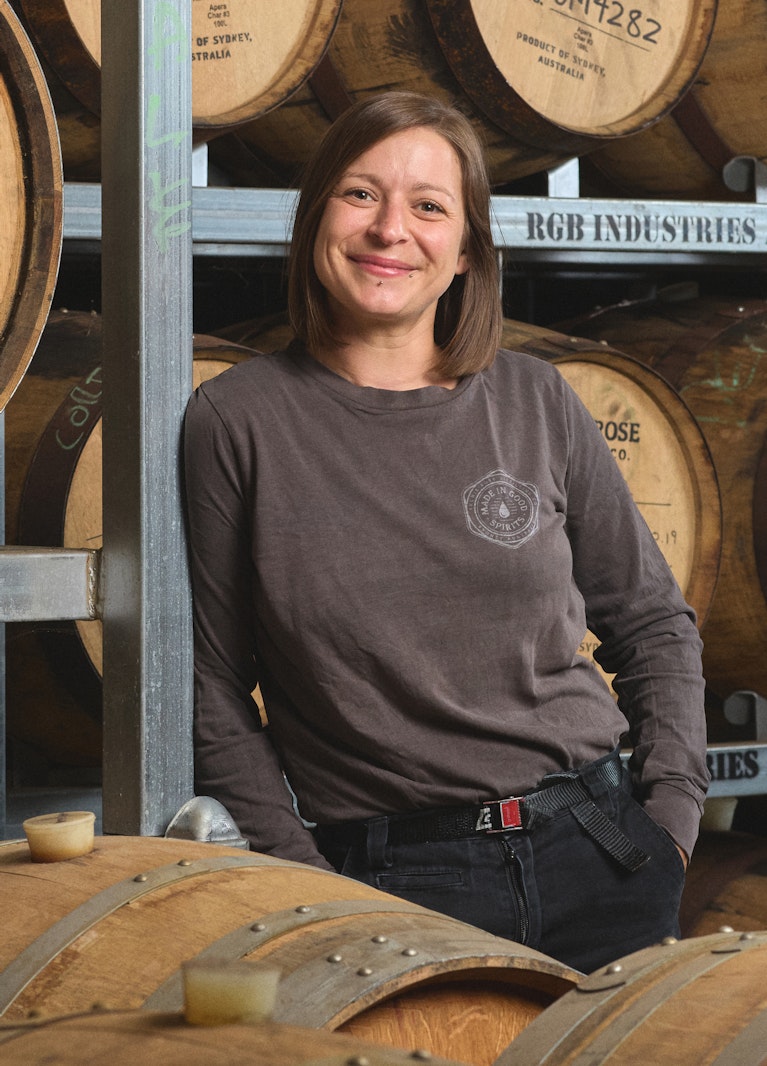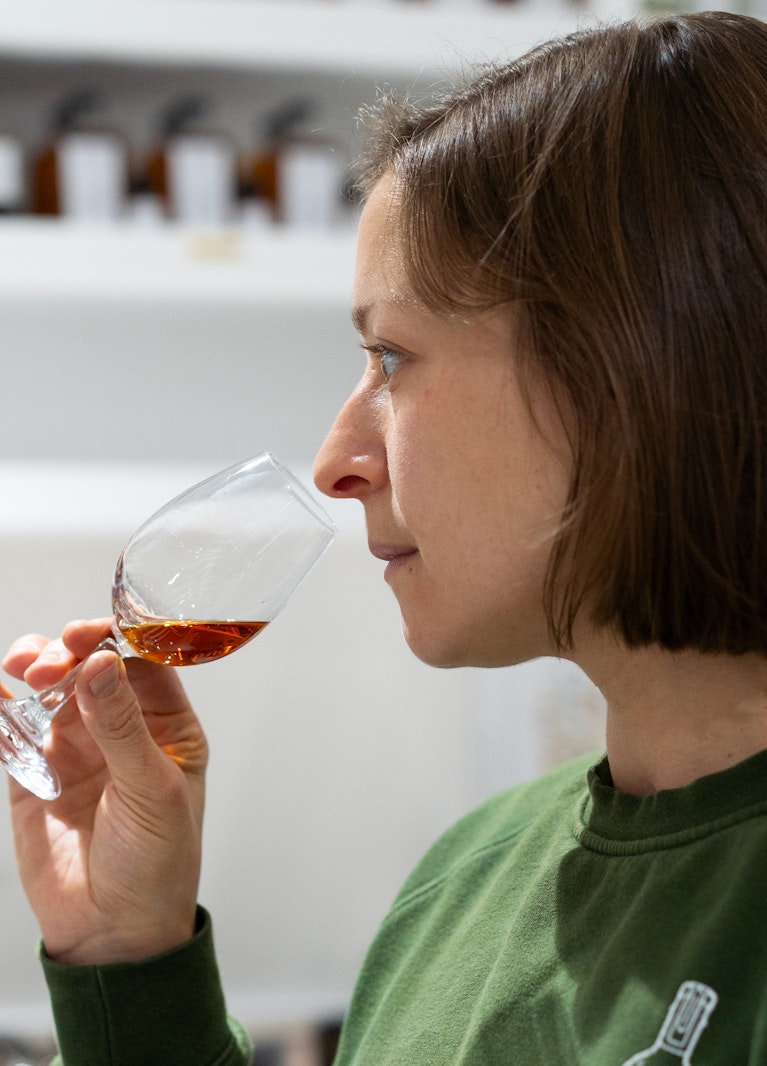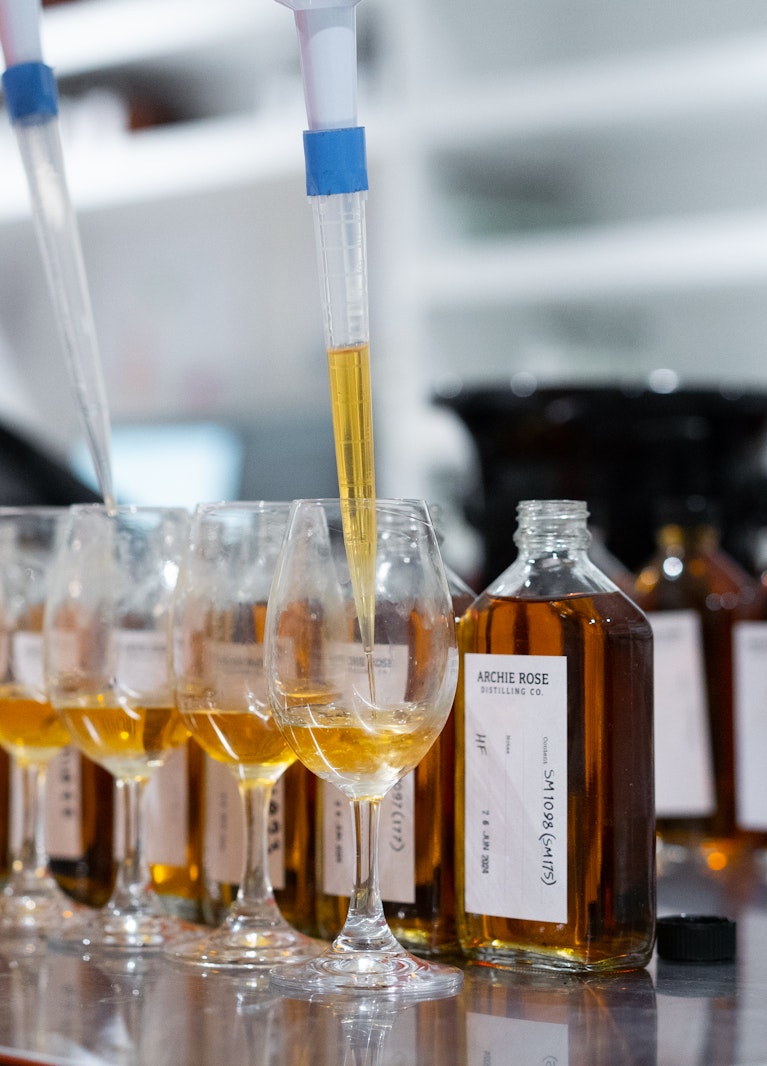Question Everything with the Sensory Team, David Fisher and Silvia Segato
For this edition’s Question Everything, we wanted to dive as deeply as possible into the work of blending. To do so, we thought we’d best leave it to the expert—in this case, Fish (David Fisher, Senior Spirits Blender), so we asked if he would allow us to be a fly on the wall during a conversation between himself and another blender. He suggested a chat with Spirits Blender Silvia Segato, who has developed a reputation as the team’s botanical blending specialist. Here’s what we heard from them:
Fish: The biggest question I’m always asked is, “How did you get a job as a blender?” So, let’s start right at the beginning. You have had a really interesting journey into your current position. Can you talk me through it?
Silvia: Well, it started 15 years ago, and I saw my career in hospitality.
I had started travelling, and I remember thinking, well, every town has a bar, so that would be a perfect arrangement for finding a job, travelling, and visiting the world. I moved to Australia, travelled around Australia, and then moved to New Zealand. I spent some time there and then moved to the UK, where I spent quite a bit of time in London, and that's where I started to take hospitality more seriously. I worked for the Zetter townhouse group for six years, which was a big learning curve. There, I began observing people and asking, “Why are we doing this?” and “How can we improve this?”
Then, working at Drink Factory, I was creating cordials, syrups, essences, redistilling spirits, exploring with texture and matching flavours for cocktail menus. I was working very closely with Tony Conigliaro and Zoe Burgess. It was very experimental at that time.
After that, I travelled a bit more, going back to Australia and moving to Hobart. It was here that I realised that I didn't want to stay in bars anymore. I started to ask myself how spirits are made; I just wanted to be at the source of it. I got a job at Lark Distillery, starting at the cellar door, and soon after moving to the distillery helping make gin and whisky.

Fish: Was that something you had thought about before Hobart? Or was it more that you got there and realised you wanted a change? There are many distilleries down there, and then you're like, why don't I go and work in a distillery?
Silvia: It was the latter. I was supervising the cellar door when they asked me to open a new bar, and I realised I didn't want to open a new bar. I knew then that my time in hospitality was up, and I needed some new challenges.
Fish: So, how did the transition happen?
Silvia: Rick Hoedjes, the head distiller in charge of Forty Spotted asked if I was interested in helping him redistill their botanical library, which made me think that this could be my next step.
Fish: That aligned well with the flavour creation work that you had done. It's a cool story. I mean, it's like that with every person, every job, every career. There's so much luck involved in the timing of things, but you still have to be willing to ask yourself: “Am I doing what's best for me right now?” That question unlocks those opportunities that arise.
Silvia: Right. We had a mentoring program during our time at Lark. I was talking to Brianna Skierka, and she asked me whether I could see myself as a distiller in the long term. It got me thinking: I'm very interested in flavours and raw materials, and maybe blending could be the next stage. Four months later, I had to move to Sydney. I only applied for one job and that was at Archie Rose as a Distiller. Then Dave came back and asked me if I would like to join as a spirit blender.
Fish: If you think back to your experience at Drink Factory with cocktails, that would have been in the late 2000s or early 2010s, right? Silvia: Yeah, early 2010s.
Fish: Thinking back on the timeline of the drinks world, the modern approach to cocktails was still new; it was only in the 2000s that it kicked off. Then, when you were working at the cocktail factory, that was quite an interesting transition point where molecular gastronomy was starting to affect how bartenders approached drinks.
Silvia: Yeah, it was a big change in my way of thinking. It was the first time that I was digging into what makes flavours. At that stage, Heston Blumenthal and Ferran Adria' were very influential in Europe and the cocktail world was getting very influenced by new techniques and approaches to senses used in gastronomy.
What was interesting at the Drinks Factory was that we moved the innovation away from the bar into a lab. The concept was that cocktails and spirits could be created with the same precision as a Michelin Star kitchen.
It was fun because initially, I worked for Grain Store, which was all about flavour matching and many vegetarian dishes where vegetables were the heroes, with meat and fish playing supporting roles. In the bar, we worked a lot on savoury cocktails, which was fun, translating kitchen recipes to the bar, like a fennel-infused bellini or a mustard martini.
We played with savoury flavours in the lab, challenging ourselves to present them in a glass, like a martini with vermouth infused with three types of beans—french beans, broad beans, and peas—creating a green martini. It was challenging but exciting to innovate.

Fish: Absolutely. I was in London at a similar time, but on the other side of hospitality, at Milk and Honey. It was about classics and using classic templates and flavours, keeping everything delicious while you explored individual flavours and ingredients more deeply. What role did classic cocktails play in your time there?
Silvia: Classics were essential, but they were often the structure of the drink around which we built the flavours. A lot of the time, we were focused on flavour, pairing our drinks with food. People might skip wine for a martini with something unique.
We focused on taking one interesting flavour and working it into a drink—like a Lucuma Physalis Pisco Sour. Or we would create complexity and layers, like with lemon—lemon sherbet, lemon bitters, and more or Hemp sour using hemp seeds, oil and protein (to create a vegan egg white)— using the same ingredients in different forms.
We even fermented cornflakes for a whiskey sour, playing with fermentation as part of the restaurant's concept. Or burnt butter infused with hay, extracted, and then topped up with champagne to make a Royale. Fish: Whoa, that's a pretty challenging flavour.
Silvia: We experimented with everything as long as there was meaning behind it.
Fish: It's really interesting. Do you have any early sensory memories that shaped your culinary journey?
Silvia: I was always around food since when I was little, eager to try and explore. I grew up helping in kitchens and getting my hands dirty in the backyard, picking fruits or foraging.
Fish: That connection to food and foraging must have been significant.
Silvia: Absolutely, it was part of my upbringing, even when it was ‘borrowing’ corn from the field next door.

Fish: Yeah, it was like growing up on a farm for me, a real connection to food that you are eating, and whilst I didn’t know it then, it has had a lasting impact on me.
Silvia: Exactly, it's about harvesting and appreciating what's available.
Fish: I think those early sensory experiences shape how we approach food and flavours.
Silvia: Definitely, they influenced my journey into hospitality and mixology.
Fish: Speaking of influences, I know you love punk and are a punk at heart, do you think that way of thinking helps in your job?
Silvia: Absolutely, following is ok, but it's about not following unthinkingly.
Fish: Totally, because that's the thing with punk, you're still allowed to follow people. It’s interesting because you and Dave (our master distiller) are very similar in how you approach things, and I believe you both have that punk mentality.
I think asking the question is really powerful. Our blending team is really lucky because it is small, but we all have very different voices, and that’s important for what we do. Your history working with flavours had a lot of alignment with what you did in gin, but what about when you moved into whisky production? Did you find that move more difficult?
Silvia: It was, but the attention to detail and methodical approach was the same, and I loved it. It's more detailed and manual, requiring technical understanding and precision at every process level, from grain preparation to barrelling. Every step is essential, and every step requires close attention.
Fish: And how does that work now? Because you don’t have anything to do with whisky. And just for the readers, I am Silvia’s boss, but you can tell it to me straight.
Silvia: I think you see different aspects. We see more of the finished product and have a lot of influence over what is happening in production. But what I do now is much more flavour-focused, which is cool. It’s all about refining and enhancing flavours, which is true in spirits, food, or even perfume.
Fish: Speaking of perfume, you recently completed a perfumery course. How did you enjoy it?
Silvia: It was, like exploring a new world of sensory experiences, similar to working with gin but with stronger intensity.
Fish: Were there any challenging scents that stood out?
Silvia: Not particularly challenging, but I enjoyed exotic scents like ylang-ylang and how different scents could be, based on origin, like sandalwood.
Fish: It’s wild, and people often forget or take for granted that perfumes, like what we work with, are natural products. People are so used to finished products that they don’t see or forget that the intermediary products of a blender or a perfumer have huge variations, both good and bad, and it’s our job to bring that all together. Having to interrogate all those differences and come up with a result is what I really love about our job.
Silvia: Exactly, your mind is constantly moving, and you stay sharp.
Fish: Yeah, we are so lucky here; even most whiskey distilleries produce one or at most two types of new makes off the still, and most of the blending comes from different casks of those two whisky types. We produce closer to twenty different new makes, and those new make styles are changing every couple of days. I mean, the complexity is daunting, but we get so much to look at from a sensory perspective that no other distillery in the world would get to see.
Silvia: Yep, we really have to pay attention to the glass because it changes so much. We also have botanicals and rum. I don’t think there are many distilleries out there that could give you this.